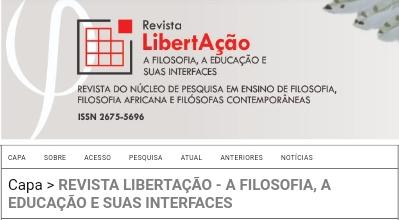Entre o embrutecimento e a emancipação: Educação para a ação
LibertAção - Volume 1 N 1 2020 • Revista LibertAção
Autor: Gilmara Coutinho Pereira
Resumo:
O artigo trata sobre a ideia de emancipação, presente na obra de Jacques Rancière O mestre ignorante, como objetivo que deve ser buscado nas práticas educacionais, em especial no ensino de filosofia. Demonstra que é preciso romper com os sistemas educacionais que privilegiam uma hierarquia de inteligências, em que o professor tudo sabe e o aluno que nada sabe aprenderá aquilo que o professor considerá-lo capaz de aprender. Trata-se de uma pesquisa teórica que considerou os que diversos autores pensam sobre a educação, a formação de professores e a relação desses com seus alunos, sempre tomando como perspectiva a defesa de um ensino que respeita todos os envolvidos no processo como atores capazes de aprenderem por si mesmos, de forma autônoma, emancipada, sem, contudo, dispensar a figura do professor como aquele que pode colaborar para a descoberta e afirmação das inteligências e vontades de conhecimento de seus alunos. Os resultados apontam que é preciso que as instituições que formam professores repensem suas estratégias, afinem mais os conteúdos teóricos com os práticos, que os professores se aproximem mais de seus alunos e principiem seu trabalho considerando que não há desigualdade das inteligências, para só assim promoverem uma educação para emancipação.
Abstract:
The article deals with the idea of emancipation, present in the work of Jacques Rancière The ignorant master, as an objective that should be pursued in educational practices, especially in the teaching of philosophy. It demonstrates that it is necessary to break with the educational systems that favor a hierarchy of intelligences, in which the teacher knows everything and the student who knows nothing will learn what the teacher considers him capable of learning. This is a theoretical research that considered what many authors think about education, teacher training and their relationship with their students, always taking as perspective the defense of a teaching that respects all those involved in the process as actors capable of to learn for themselves, in an autonomous, emancipated manner, without, however, dismissing the figure of the teacher as one who can contribute to the discovery and affirmation of their students’ intelligences and desires for knowledge. The results indicate that it is necessary that the institutions that form teachers rethink their strategies, to better refine the theoretical contents with the practical ones, that the teachers get closer to their students and start their work considering that there is no inequality of intelligences, only to promote them an education for emancipation.
ISSN: 2675-5696
Texto Completo: http://revista.uepb.edu.br/index.php/ENFIMAFA/article/view/5166/3432
Palavras-Chave: Emancipação intelectual. Escola. Ensino de Filosofia. Mestre ignorante.

